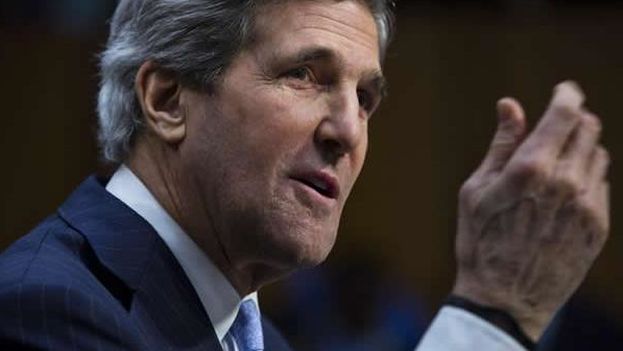
![]() 14ymedio, 3 March 2016 – United States Secretary of State John Kerry has cancelled his trip to Cuba just days before President Barack Obama’s visit to the island. The decision was made because of disagreements with the Cuban government on the issue of human rights, according to an article published Thursday by the Los Angeles Times.
14ymedio, 3 March 2016 – United States Secretary of State John Kerry has cancelled his trip to Cuba just days before President Barack Obama’s visit to the island. The decision was made because of disagreements with the Cuban government on the issue of human rights, according to an article published Thursday by the Los Angeles Times.
Kerry’s refusal to travel to Cuba makes clear just how “thorny” is the path to the reestablishment of relations between the United States and Cuba, despite the announcements of economic relaxations and the trips taken in the last year, according to the US newspaper.
The news was confirmed to 14ymedio by a source close to the White House, which did not add any details about the reasons for the cancellation.
Kerry, who last August became the first Secretary of State to visit Cuba in 70 years, said last week that he would return to the island “in a week or two, to have a dialog on human rights.”
The Secretary of State thus assumed a leadership role in the dialog that so far had been led by one of his subordinates, Undersecretary of State Tom Malinowski.
According to reports from the Cuban Commission for Human Rights and National Reconciliation (CCDHRN), in January of this year at least 1,414 arrests for political reasons were reported.
Kerry appeared before four hearings of the US Congress, where several Republican lawmakers pressed him to cite progress on human rights in Cuba and denounced that the situation has worsened since the establishment of diplomatic relations.
“I would like to go to your optometrist, because the rose-colored glasses (through which you look at Cuba) are incredible,” Cuban-born Republican Congresswoman Ileana Ros-Lehtinen chided Kerry last Thursday, as she denounced the “mass arrests” on the island.
During this visit to the island Kerry would have held the first formal round of dialog on human rights, after a preliminary meeting in March 2015 in Washington, which was limited to defining the methodology and structure of the bilateral conversations on the subject.
Last week Kerry also lamented that Cuba had again arrested five of the 53 political prisoners released as part of the agreement with the United States.
The White House, for its part, celebrated that the government of Raul Castro granted permission to seven former Cuban political prisoners of the “Group of 75” from the 2003 Black Spring, to travel abroad “one time,” and called on the authorities of the island to extend the authorization to the four former prisoners who had not received it.
White House spokesman Peter Boogard said that right now that the United States is urging “the Government of Cuba to respect the rights of all citizens of Cuba.”
“We continue to have differences with Cuba in these matters, and our new policy towards Cuba allows us to directly raise our concerns with the Cuban government and better advocate for human rights,” Boogard said.
Obama will visit the island March 21-22 on the first trip to Cuba by a sitting US president in 88 years; among the objectives of his agenda is influencing an improvement in human rights.
